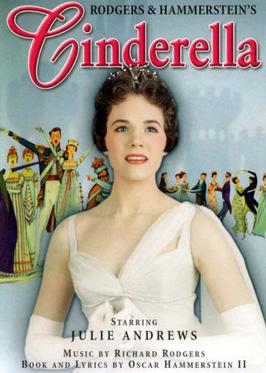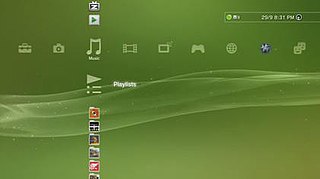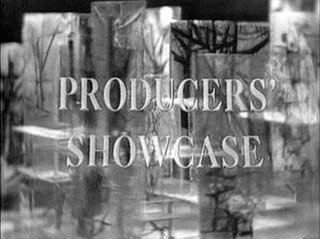
The Electric Company is an American educational children's television series produced by the Children's Television Workshop. It was co-created by Paul Dooley, Joan Ganz Cooney, and Lloyd Morrisett. The series aired on PBS for 780 episodes over the course of its six seasons from October 25, 1971, to April 15, 1977. The program continued in reruns until October 4, 1985. The Electric Company later reran on Noggin, a channel co-founded by the CTW, from 1999 to 2003. Noggin also produced a compilation special for the show.
A music video is a video that integrates a song or an album with imagery that is produced for promotional or musical artistic purposes. Modern music videos are primarily made and used as a music marketing device intended to promote the sale of music recordings. These videos are typically shown on music television and on streaming video sites like YouTube, or more rarely shown theatrically. They can be commercially issued on home video, either as video albums or video singles. The format has been described by various terms including "illustrated song", "filmed insert", "promotional (promo) film", "promotional clip", "promotional video", "song video", "song clip", "film clip", "video clip", or simply "video".

Mister Rogers' Neighborhood is an American half-hour educational children's television series that ran from 1968 to 2001. It was created and hosted by Fred Rogers. Its original incarnation, the series Misterogers debuted in Canada on October 15, 1962, on CBC Television. In 1966, Rogers moved back to the United States creating Misterogers' Neighborhood, later called Mister Rogers' Neighborhood, on the regional Eastern Educational Television Network. The US national debut of the show occurred on February 19, 1968. It aired on NET and its successor, PBS, until August 31, 2001.

Masterpiece is a drama anthology television series produced by WGBH Boston. It premiered on PBS on January 10, 1971. The series has presented numerous acclaimed British productions. Many of these are produced by the BBC, but the lineup has also included programs shown on the UK commercial channels ITV and Channel 4.

Schoolhouse Rock! is an American interstitial programming series of animated musical educational short films which aired during the Saturday morning children's programming block on the U.S. television network ABC. The themes covered included grammar, science, economics, history, mathematics, and civics. The series' original run lasted from 1973 to 1985; it was later revived from 1993 to 1996. Additional episodes were produced in 2009 for direct-to-video release.
A feature film or feature-length film, also called a theatrical film, is a narrative film with a running time long enough to be considered the principal or sole presentation in a commercial entertainment program. The term feature film originally referred to the main, full-length film in a cinema program that included a short film and often a newsreel. Matinee programs, especially in the US and Canada, in general, also included cartoons, at least one weekly serial and, typically, a second feature-length film on weekends.

NFL Primetime is a sports television program that has aired on ESPN since 1987. The show is presented similarly to ESPN's own SportsCenter, featuring scores, highlights, and analysis of every game of the week in the NFL.

Dragon Tales is an animated educational fantasy children's television series created by Jim Coane and Ron Rodecker, developed by Coane, Wesley Eure, Jeffrey Scott, Cliff Ruby and Elana Lesser, and produced by the Children's Television Workshop, Columbia TriStar Television and Adelaide Productions. The series focuses on the adventures of two siblings, Emmy and Max, and their dragon friends Cassie, Ord, and Zak and Wheezie.

The Lawrence Welk Show is an American televised musical variety show hosted by big band leader Lawrence Welk. The series aired locally in Los Angeles for four years, from 1951 to 1955, then nationally for another 16 years on ABC from 1955 to 1971, followed by 11 years in first-run syndication from 1971 to 1982. Repeat episodes are broadcast in the United States by PBS stations. These airings incorporate an original program — usually, a color broadcast from 1965 to 1982 — in its entirety. In place of the commercials, newer performance and interview clips from the original stars and/or a family member of the performers are included; these clips are occasionally updated.

Rodgers and Hammerstein's Cinderella is a musical written for television, but later played on stage, with music by Richard Rodgers and a book and lyrics by Oscar Hammerstein II. It is based upon the fairy tale Cinderella, particularly the French version Cendrillon, ou la petite pantoufle de verre, by Charles Perrault. The story concerns a young woman forced into a life of servitude by her cruel stepmother and self-centered stepsisters, who dreams of a better life. With the help of her fairy godmother, Cinderella is transformed into a princess and finds her prince.

Kid Pix is a bitmap drawing program designed for children. Originally created by Craig Hickman, it was first released for the Macintosh in 1989 and subsequently published in 1991 by Broderbund. Hickman was inspired to create Kid Pix after watching his son Ben struggle with MacPaint, and thus the main idea behind its development was to create a drawing program that would be very simple to use.

"Highway Star" is a song by the English rock band Deep Purple. It is the opening track on the band's sixth studio album Machine Head (1972) and is the fastest tempo song on the album. It is characterised by long, classically inspired guitar and organ solos.

The XrossMediaBar is a graphical user interface developed by Sony Computer Entertainment. The interface features icons that are spread horizontally across the screen. Navigation moves the icons, instead of a cursor. These icons are used as categories to organize the options available to the user. When an icon is selected on the horizontal bar, several more appear vertically, above and below it. They, in turn, are selectable by the up and down directions on a directional pad.

BBC Select was an overnight television service run by the BBC during the hours when BBC1 or BBC2 had closed down, usually between 2am and 6am. The channel showed programming intended for specialist audiences, such as businessmen, lawyers, nurses and teachers, and was designed to be viewed after broadcast via a video recording. It was funded by a subscription, and most programming was scrambled.

Producers' Showcase is an American anthology television series that was telecast live during the 1950s in compatible color by NBC. With top talent, the 90-minute episodes, covering a wide variety of genres, aired under the title every fourth Monday at 8 pm ET for three seasons, beginning October 18, 1954. The final episode, the last of 37, was broadcast May 27, 1957.

An illustrated song is a type of performance art that combines either live or recorded music with projected images. It was a popular form of entertainment in the early 20th century in the United States.

Symphonic Legends – Music from Nintendo was a symphonic tribute concert held in Cologne, Germany on 23 September 2010 by the WDR Rundfunkorchester Köln, featuring video game music from Japanese game developer Nintendo. The concert featured symphonic arrangements found in some of Nintendo's biggest game series, such as Legend of Zelda, Super Mario Bros., Pikmin, F-Zero and Donkey Kong. The concert was produced and directed by Thomas Böcker, with arrangements provided by Finnish composers and musicians Jonne Valtonen and Roger Wanamo, as well as Japanese game music composers Masashi Hamauzu, Hayato Matsuo, Shiro Hamaguchi and German film composer Torsten Rasch.
"Highlights" is a song by American hip-hop artist Kanye West, from his seventh studio album, The Life of Pablo (2016). The song features vocals from Young Thug and The-Dream. One day before the album was released, West performed the song on Saturday Night Live with Young Thug, El DeBarge, Kelly Price and The-Dream. Within the track, West takes a shot at Ray J. The song was met with mixed reviews from music critics. It was revealed in July 2016 that West had a shot a music video, but it was never released.
Where in the Universe Is Carmen Sandiego? is an educational planetarium program and live theatrical production and part of the Carmen Sandiego franchise. Licensed to planetariums across the US, Canada, and Japan, the show premiered in 1998 or 1999. The program featured the effects work of Adrian Ropp and was produced by Dr. William A. Gutsch, with music composed by Mark Mercury. Inspired by the successful television programs Where in the World Is Carmen Sandiego? and Where in Time Is Carmen Sandiego?, the series aimed to promote listening and math skills through interactive sessions rather than relying on memorized facts. The shows encouraged audience participation by incorporating question-and-answer segments.

Alai Payuthey is the soundtrack album, composed by A. R. Rahman, to the 2000 Indian Tamil film of the same name. The soundtrack album consists of nine tracks from the original Tamil version of the album, whereas the Telugu version has seven tracks. The soundtrack of Alaipayuthey was unanimously hailed as a Mani Ratnam film soundtrack turning for rhythmic fusion using modern synthesizers. A film, initially planned with film score, eventually took place.














